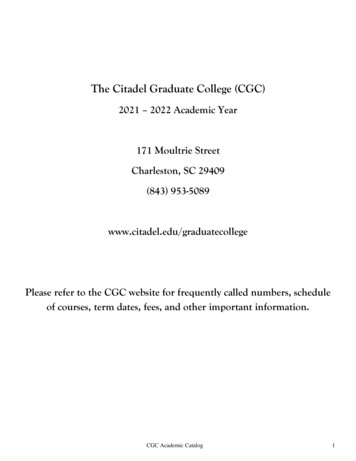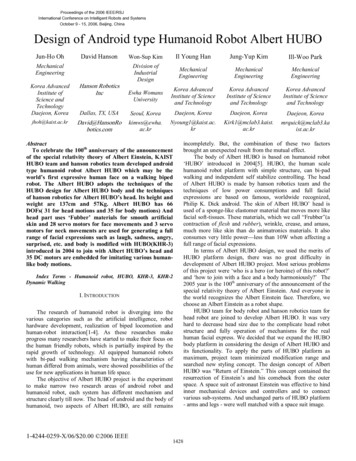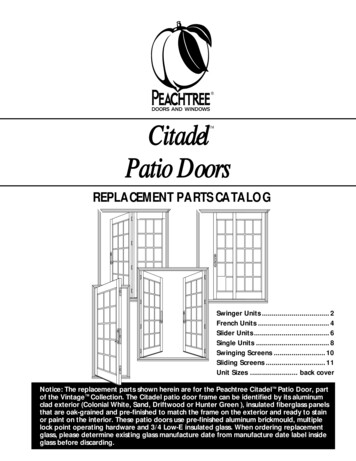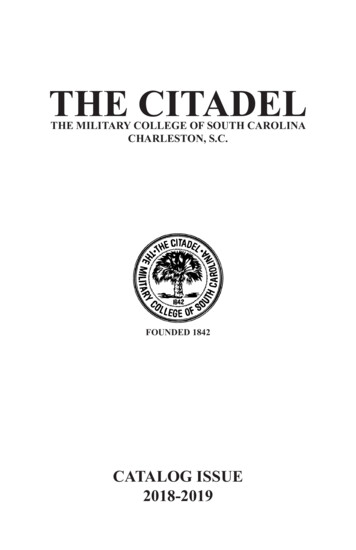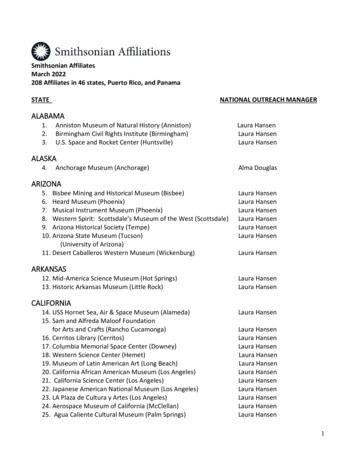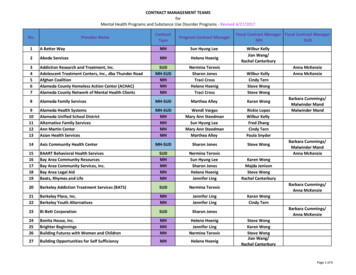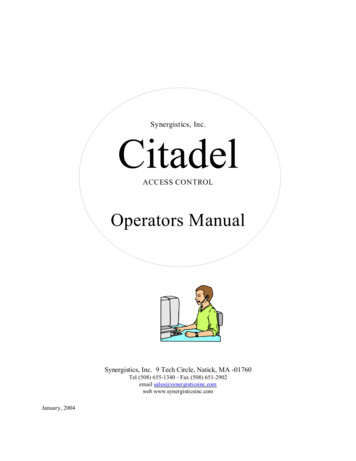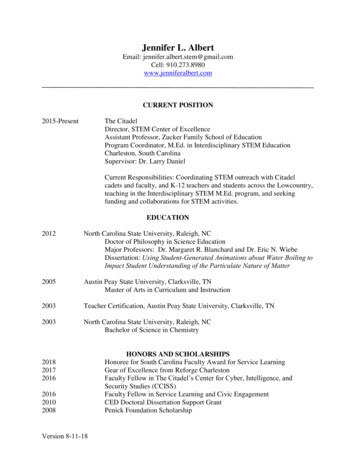
Transcription
Jennifer L. AlbertEmail: jennifer.albert.stem@gmail.comCell: 910.273.8980www.jenniferalbert.comCURRENT POSITION2015-PresentThe CitadelDirector, STEM Center of ExcellenceAssistant Professor, Zucker Family School of EducationProgram Coordinator, M.Ed. in Interdisciplinary STEM EducationCharleston, South CarolinaSupervisor: Dr. Larry DanielCurrent Responsibilities: Coordinating STEM outreach with Citadelcadets and faculty, and K-12 teachers and students across the Lowcountry,teaching in the Interdisciplinary STEM M.Ed. program, and seekingfunding and collaborations for STEM activities.EDUCATION2012North Carolina State University, Raleigh, NCDoctor of Philosophy in Science EducationMajor Professors: Dr. Margaret R. Blanchard and Dr. Eric N. WiebeDissertation: Using Student-Generated Animations about Water Boiling toImpact Student Understanding of the Particulate Nature of Matter2005Austin Peay State University, Clarksville, TNMaster of Arts in Curriculum and Instruction2003Teacher Certification, Austin Peay State University, Clarksville, TN2003North Carolina State University, Raleigh, NCBachelor of Science in Chemistry201820172016201620102008Version 8-11-18HONORS AND SCHOLARSHIPSHonoree for South Carolina Faculty Award for Service LearningGear of Excellence from Reforge CharlestonFaculty Fellow in The Citadel’s Center for Cyber, Intelligence, andSecurity Studies (CCISS)Faculty Fellow in Service Learning and Civic EngagementCED Doctoral Dissertation Support GrantPenick Foundation Scholarship
Albert, J.L.PROFESSIONAL EMPLOYMENT2013-2015North Carolina State UniversityPostdoctoral ScholarRaleigh, North CarolinaSupervisor: Dr. Tiffany BarnesResponsibilities: Project Director for the NCSU portion of the NSF grantentitled FRABJOUS CS - Framing a Rigorous Approach to Beauty andJoy for Outreach to Underrepresented Students in Computing at Scale.Coordinating high school teachers and their students and collecting bothquantitative and qualitative data as they pilot the course this school year.June-Sept 2013North Carolina State UniversityEducational ConsultantRaleigh, North CarolinaSupervisor: Sheila BrownResponsibilities: Helped develop and review items for the 8th gradescience and Biology test banks, which will be used for review,benchmarks, and End-of-Grade exams (formerly ClassScape, now CBIB).2010-2013North Carolina State UniversityResearch Associate/Project ManagerSTEM Teams GrantRaleigh, North CarolinaSupervisor: Dr. Margaret BlanchardResponsibilities: Helped conduct mixed methods research study on STEMStrategic Teaming model and professional development with 45 schoolleaders, 45 middle school teachers (science, technology, math, languagearts, and social studies), and 2300 students in 5 middle schools and 5school districts, arrange for multi-county permission, recruit participants,develop professional development activities, help develop instruments,conduct workshops, provide technical support, plan statistical analyses,collect data on teaching, analyze data, and communicate results.2009-2010Outreach Coordinator, The Science HouseInstructional Coach for 10 Elementary Teacher for PRISM MSP GrantNorth Carolina State UniversityResponsibilities: Provided science professional development and supportfor teachers and students in Cumberland and 6 surrounding counties. Parttime instructional coach for nine elementary school teachers for CCS MSPGrant (Dec 2009-June 2010).2008-2009Graduate Research Assistant, NC Quest GrantNorth Carolina State University2
Albert, J.L.Responsibilities: Helped conduct mixed methods research study onprofessional development with 30 middle school teachers (science,technology, math, language arts, and social studies) in 2 schools and 2counties, arrange for multi-county permission, recruit participants, developunits, conduct workshops, provide technical support, plan statisticalanalyses, collect data on teaching, analyze data, and communicate results.2006-2008Graduate Research Assistant, 21CTL GrantNorth Carolina State UniversityResponsibilities: Helped conduct mixed methods research study with 30middle school teachers (math and science) in 9 schools and 6 counties,arrange for multi-county permission, recruit participants, develop units,conduct workshops, provide technical support, plan statistical analyses,collect data on teaching, analyze data, and communicate results.2003-2006Science Teacher, Northwest High School and Rossview High School,Clarksville, TN (Taught AP Chemistry, Chemistry, Physical Science, LifeScience, and 6 weeks of Spanish)TEACHINGThe CitadelEDUC 499/520 Internship in Student Teaching – Spring 2016EART 201 Earth Science for Educators – Fall 2016, Summer 2017EDUC 547 Research in STEM Education – Fall 2016, Summer 2018EDUC 543 Teaching, Learning, and Assessing with Technology –Summer 2016, Summer 2017, Summer 2018EDUC 401 – Methods in Secondary Teaching – Spring 2017, Spring 2018EDUC 549 – Applications of Data Methods – Spring 2017EDUC 680 – Foundations of STEM II – Spring 2017, Spring 2018EDUC 587 – Science of Food – Summer 2017, Summer 2018EDUC 101 – Educational Foundations – Fall 2017EDUC 546 – Leadership and Critical Thinking in STEM Education – Fall2017, Fall 2018EDUC 544 – Project-Based Learning in STEM Education – Spring 2018EDUC 548 – Multidisciplinary Experimental Design and Implementation– Fall 2018North Carolina State UniversityEMS 573 Technology Tools for Science Teaching; synchronous/online,Fall 2011 – Co- instructor/Fall 2012 – Lead instructorEMS 531 Introduction to Research in Science Education;synchronous/online, Spring 2012 – Co-instructor for halfsemesterEMS 521 Advanced Methods I in Science Education; synchronous/online,Spring 2011 – Co-instructor3
Albert, J.L.EMS 203 Introduction to Teaching Science – Spring 2008 TeachingAssistantEMS 375 Methods of Teaching Science I – Spring 2009 TeachingAssistantEMS 476 Supervised 1 student teacher - Fall 2011 – 8th grade scienceMaster’s Thesis CommitteeKimberly Gray (Summer 2017)Thesis: Impact of a summer camp exposing children to science, technology, engineering, arts,and mathematicsGRANTS and GIFTSAwardedAlbert, J., Jocius, R., Joshi, D. & Robinson, R. Collaborative Research: Integrating computingin STEM: Designing, developing, and investigating a team-based professionaldevelopment model for middle- and high-school teachers. NSF-STEM C Award #1742332, 1,536,264, Sept. 2017 – Aug. 2020.Albert, J., & Jocius, R. Determining the Efficacy of Maker Activities by Navigating Discourse(DEMAND). NSF-EAGER Award # 1723661, 284,560, June 2017 – June 2019.Albert, J., Robinson, R., & Jocius, R. Improving Teacher Quality Grant: Promoting ProblemSolving & Sense Making: Engaging Teachers in the Mathematical Process. SCCommission of Higher Education. 172,257.50, January 2017-August 2018.Joshi, D., Robinson, R., & Albert, J. Centers of Excellence Grant: STEM Ambassadors. SCCommission on Higher Education. 112,500, Sept. 2017-2018.Albert, J. Regional Partnership with Code.org. 87,200, Sept. 2016 – Aug. 2019.Joshi, D., Robinson, R., & Albert, J. Centers of Excellence Grant: STEM Ambassadors. SCCommission on Higher Education. 112,500, Sept. 2016-2017.Gosha, K, Lewis, C & Albert, J. Broadening Participation Research Project: ExploringComputing Careers through a Virtual Career Fair Using Embodied ConversationalAgents. NSF-HBCU-UP Award #1533627, 348,501, Sept 2015-2017.Albert, J. Google CS4HS Grant, 35,000. March 2016-2017.Albert, J. Gift of 100,000 for Citadel Sustainability Project from Tiger Corner Farm, December2016Albert, J. Gift of 10,000 for Citadel Sustainability Project from Alumni, February 2016.PUBLICATIONSRefereed Journal ArticlesAlbert, J. L., Keene, K., Barnes, T. M., & Catete, V. (submitted). Characterizing beauty and joyof computing instructors during early implementation of computer science principles.Addy, T. M., Simmons, P. E., Gardner, G. E. & Albert, J. L. (2015). A New “Class” ofUndergraduate Professors: Examining Teaching Beliefs and Practices of Science Facultywith Education Specialties. Journal of College Science Teaching, 44(3).4
Albert, J.L.Albert, J. L., Blanchard, M. R., Kier, M. W., Carrier, S. J., & Gardner, G. E. (2014). Supportingteachers’ technology integration: A descriptive analysis of social and teaching presencein technical support sessions. Journal of Technology and Teacher Education, 22(2), 137165.Kier, M. W., Blanchard, M. R., Osborne, J. W., & Albert, J. L. (2014). The Development of theSTEM career interest survey (STEM-CIS). Research in Science Education, 44(3), 461481.Book ChapterAlbert, J. L., Blanchard, M. R., & Wiebe, E. N. (2015). How high school students construct orcreate animations about water boiling. In K.D. Finson & J. Pederson (Eds.), Applicationof Visual Data in K-16 Science Classrooms.Refereed Practitioner Journal ArticlesImam, S., Albert, J.L., Jocius, R. (in press). How Do You Stay Fit in Space?: ExploringExercise Through Project-Based Learning. Science Scope.Blanchard, M. R., Kier, M. W., Stevens, V. & Albert, J. L. (2017). STEM Bingo: A STEMCareers Game. Science Scope.Albert, J. L., Blanchard, M. R., Keene, K., & Kinton, J. (2014). The Great Iced Tea Debate.Science Scope, 37(8).Kier, M. W., Blanchard, M. R., & Albert, J. L. (2014). iTouch a STEM career. Science Scope,37(6).Blanchard, M. R. & Albert, J. L. (2011). Tried and True: No Matter the Weather, We’llMeasure Together. Science Scope, 34(9), 66-70. [Accessed by 60,000 NSTA members]Albert, J. L., Blanchard, M. R., Grable, L. L., & Reed, R. (2010). It’s ELEMENTARY Watson!A crime scene investigation with a technological twist. Science Scope, 34(4), 16-22.[Accessed by 60,000 NSTA members]Blanchard, M. R., Sharp, J. L., & Grable, L. L. (2009). Rev your engines! Linking physicalscience and math with car labs. The Science Teacher, 76(2), 35-40.Conference ProceedingsAlbert, J. L., Jones, K. R., Joshi, D., & Jocius, R. (2016). What do Activity Trackers and aTablet Have in Common? STEM Ambassador Lesson Plans, Tips, and Tricks.Proceedings of the Society for Information Technology & Teacher EducationInternational Conference 2016.Albert, J. L., Wiebe, E. N., & Blanchard, M. R. (2012). Do student-generated digitalanimations enhance student understanding of water boiling? A study comparing student learningin a Sci Vis course. Proceedings of the Association for Science Teacher Education 2012.Retrieved 4-01-12 from oceedings.plBlanchard, M. R., Grable, L. L. & Sharp, J. L. (2009). Scaffolding Technology Integrationof Middle School Science and Mathematics: Comparing the Results of Two Models ofTeacher Professional Development. In I. Gibson et al. (Eds.), Proceedings of Society forInformation Technology & Teacher Education International Conference 2009 (pp. 40154019). Chesapeake, VA: AACE.Blanchard, M. R., Sharp, J. L., & Grable, L. L. (2009). Videoconferencing versus Face-to-Face:5
Albert, J.L.Comparing the satisfaction of rural, middle school teachers with two different follow-upmethods to teacher professional development. Proceedings of the Association for ScienceTeacher Education 2009. Retrieved 2-24-10 from edings.pl.Conference Paper/Poster PresentationsJocius, R., Albert, J.L., & Andrews, A. (submitted, 2019, April). Navigating standards-basedmaking practices in elementary classrooms. Paper to be presented at the AmericanEducational Research Association Conference, Toronto, CA.Albert, J.L., Jocius, R., & Andrews, A. (submitted, 2019, January). Standards-based makingpractices in elementary classrooms. Paper to be presented at the Association for ScienceTeacher Education Conference, Savannah, GA.Miller, M., Ganezer, J., Cudd, R. M., Gustafson, D., & Albert, J. L. (2018, March). Comparingnutrients and quality of aeroponically grown lettuce versus lettuce purchased from agrocery store. Paper presented at the 79th Annual Meeting of Association of SoutheasternBiologists, Myrtle Beach, SC.Albert, J.L., Jocius, R., Robinson, R., & Joshi, D. (2018, March). Lesson learned from PD onProblem-Solving and Sense-Making. Paper presented at the Interdisciplinary STEMTeaching & Learning Conference, Savannah, GA.Koester, M., Van Sickle, M., & Albert, J. (2018, January). Making a case for STEAM: It’s notjust an educational fad. Paper presented at the annual meeting of the Association forScience Teacher Education Conference, Baltimore, MD.Gaspar, A, Golam, A. T. M., Wiegand, R. P., Bucci, A., Kumar, A., & Albert, J. L. (2017,May). Evolutionary Practice Problems Generation: More Design Guidelines. Paperpresented at the international annual meeting of The Florida Artificial IntelligenceResearch Society, Key Largo, FL.Albert, J. L. (2017, January). Impact of a unique STEM competition on students and teachers.Paper presented at the annual meeting of the Association for Science Teacher EducationConference, Des Moines, IA.Bucci, A., Wiegand, R. P., Kumar, A., Albert, J. L., & Gaspar, A. (2016, May). Dimensionextraction analysis of student performance on problems. Paper presented at theinternational annual meeting of The Florida Artificial Intelligence Research Society, KeyLargo, FL.Price, T. W., Catete, V., Albert, J. L., & Barnes, T. M. (2016, March). Lessons Learned from"BJC" CS Principles Professional Development. Paper presented at the annual meeting ofthe ACM Special Interest Group on Computer Science Education, Memphis, TN.Wiegand, R. P., Kumar, A., Bucci, A., Albert, J. L., & Gaspar, A. (2016, March). A data-drivenanalysis of informatively hard concepts in introductory programming. Paper presented atthe annual meeting of the ACM Special Interest Group on Computer Science Education,Memphis, TN.Albert, J. L. (2016, January). Adding computational thinking to your science lesson: whatshould it look like? Paper presented at the annual meeting of the Association for ScienceTeacher Education Conference, Reno, Nevada.Price, T. W., Catete, V., Albert, J. L., & Barnes, T. M. (2015, August). Determining the impactof teacher professional development on perceived ability to teach a computer science6
Albert, J.L.principles course. Paper presented at the annual meeting of the International ComputingEducation Research Workshop, Omaha, Nebraska.Brown, R., Lynch, C. F., Eagle, M., Albert, J. L., Barnes, T. M., Baker, R., Bergner, Y., &McNamara, D. (2015, June). Good communities and bad communities: Does membershipaffect performance? Poster presented at the Educational Data Mining Conference,Madrid, Spain.Brown, R., Lynch, C. F., Wang, Y., Eagle, M., Albert, J. L., Barnes, T. M., Baker, R., Bergner,Y., & McNamara, D. (2015, June). Communities of performance and communities ofpreference. Paper presented at the Graph Analytics Workshop at the Educational DataMining Conference, Madrid, Spain.Albert, J. L. (2015, April). Adding computational thinking to your science lesson: what could itlook like? Paper presented at the annual meeting of the National Association for Researchin Science Teaching, Chicago, IL.Albert, J. L., Peddycord, B. W., & Barnes, T. M. (2015, March). Evaluating Scratch programsto assess computational thinking in a science lesson. Poster presented at the annualmeeting of the ACM Special Interest Group on Computer Science Education, KansasCity, MO.Albert, J. L., Blanchard, M. R., Kier, M. W., Carrier, S. J., & Gardner, G. E. (2014, January).Social and teaching presence in technical support sessions: A descriptive analysis. Paperpresented at the annual meeting of the Association for Science Teacher Education, SanAntonio, TX.Alsbury, T. L., Overstreet, N. A., Blanchard, M. R., & Albert, J. L. (2013, April). Using aDistrict-wide Strategic Teaming Model to assist innovation and reform in impoverisheddistricts: Innovation Leaders Academy. Paper presented at the annual meeting of theAmerican Educational Research Association in San Francisco, CA.Kier, M. W., Blanchard, M. R., Osborne, J. W., & Albert, J. L., (2013, April).The Development of the STEM Career Interest Surveys (STEM-CIS). Paper presented atthe annual meeting of the National Association for Research in Science Teaching, RioGrande, Puerto Rico.Albert, J. L., Blanchard, M. R., & Wiebe, E. N. (2013, April). Using student-generatedanimations to assess student understanding of the particulate nature of matter. Paperpresented at the annual meeting of the National Association for Research in ScienceTeaching, Rio Grande, Puerto Rico.Albert, J. L., Banks, A. J., Banks, J., & Banks, C. (2013, January). Clickers versus cell phones:A comparison of student response systems and their effect on student achievement in alarge lecture chemistry course. Paper presented at the annual meeting of the Associationfor Science Teacher Education, Charleston, SC.Kier, M.W., Blanchard, M. R., Osborne, J.W., & Albert, J. L., (2013, January). TheDevelopment of the STEM Career Interest Surveys (STEM-CIS). Paper presented at theannual meeting of the Association for Science Teacher Education, Charleston, SC.Alsbury, T. L., Overstreet, N. A., Blanchard, M. R., Osborne, J. W., Williams, B., Albert, J. L.,Kier, M. W. & Reed, R. (2012, November). Innovation Leaders Academy: Sustaininginnovation in high need districts. Paper presented at the annual convention of theUniversity Council for Educational Administration, Denver, CO.7
Albert, J.L.Albert, J. L. & Blanchard, M. R. (2012, September). Student-Generated Digital Animations as aForm of Assessment. Paper presented at the annual meeting of the Mid-AtlanticAssociation for Teacher Education, Pembroke, VA.Albert, J. L., Blanchard, M. R., & Wiebe, E. N. (2012, March). Exploring student-createdanimations to show level of understanding on nature of matter learning progression.Poster presented at the annual international meeting of the National Association forResearch in Science Teaching, Indianapolis, IN.Blanchard, M. R., Osborne, J. W., & Albert, J. L. (2012, March). Is it Possible to ExplicitlyStimulate Pedagogical Discontentment in Science Teachers through a GraduateCourse? Paper presented at the annual international meeting of the National Associationfor Research in Science Teaching, Indianapolis, IN.Albert, J. L., & Banks, A. J. (2012, February). A comparison of student response systems andtheir effect on student achievement in a large lecture chemistry course. Paper presented atthe annual meeting of the Eastern Educational Research Association, Hilton Head, SC.Blanchard, M. R., Osborne, J. W., & Albert, J. L. (2012, February). Is it possible to explicitlystimulate pedagogical discontentment in science teachers through a graduate course?Paper presented at the annual meeting of the Eastern Educational Research Association,Hilton Head, SC.Albert, J. L., Wiebe, E. N., & Blanchard, M. R. (2012, January). Do student-generated digitalanimations enhance student understanding of water boiling? A study comparing studentlearning in a Sci Vis course. Paper presented at the annual meeting of the Association ofScience Teacher Educators, Clearwater, Florida.Albert, J. L., Wiebe, E. N., & Blanchard, M. R. (2011, September). Student-generated digitalanimations: A study comparing student learning in a Sci Vis course. Poster presented atthe annual meeting of the Mid-Atlantic Association of Science Teacher Educators, CarterCaves, Kentucky.Blanchard, M. R., Albert, J. L., & Osborne, J. W. (2011, September). Exploring theRelationship of Pedagogical Discontentment to Teachers’ Changes in Practices. Paperpresented at the international biannual meeting of the European Science EducationResearch Association, Lyon, France.Blanchard, M. R., Osborne, J. W., & Albert, J. L. (2011, April). Are There Benefits toPedagogical Discontentment?: A Two-Year Study Exploring its Link to Rural Science &Mathematics Teachers’ Changes in Practices. Paper presented at the annual meeting ofthe American Educational Research Association, New Orleans, LA.Addy, T. M., Simmons, P. E., Gardner, G. E., & Albert, J. L. (2011, April). Epistemologicalbeliefs & teaching practices of science faculty with education specialties. Paperpresented at the annual meeting of the National Association for Research in ScienceTeaching, Orlando, FL.Albert, J. L. & Wiebe, E. N. (2011, March). Taking drawing digital: Using student-generateddrawings to help students learn about molecules. Paper presented at the annual meetingof the National Association for Research in Science Teaching, Orlando, FL.Blanchard, M. R., Osborne, J. W., & Albert, J. L. (2011, March). Results of a two-yearstudy: Exploring the relationship of teachers’ pedagogical discontentment to changes inpractices for 28 rural science and mathematics teachers. Paper presented at the annualmeeting of the National Association for Research in Science Teaching, Orlando, FL.8
Albert, J.L.Banks, A. J. & Albert, J. L. (2010, August). Clickers in a non-science majors course. Paperpresented at the 21st Biennial Conference on Chemical Education, Denton, TX.Blanchard, M. R., Osborne, J. W., & Sharp, J. L. (2010, March). Investigating the role ofpedagogical discontentment in rural science and mathematics teachers’ changes inpractice: An exploration of 23 rural science and mathematics teachers followingtechnology-infused teacher professional development. Paper presented at the annualnational meeting of the National Association for Research in Science Teaching,Philadelphia, PA.Blanchard, M. R., Sharp, J. L., and Grable, L. L. (2009). Scaffolding technology integration ofmiddle school science and mathematics: comparing the results of two models of teacherprofessional development. Paper presented at the annual international meeting of theSociety for Information Technology and Teacher Education, Charleston, SC.Blanchard, M. R., Sharp, J. L., and Grable, L. L. (2009, January). Videoconferencing versusface-to-Face: Comparing the satisfaction of rural, middle school teachers with twodifferent follow-up methods to teacher professional development. Paper presented at theannual international meeting of the Association for Science Teacher Educators, Hartford,CT.Blanchard, M. R. & Sharp, J. L. (2008). Comparing Two Methods of Technical Support forTeachers: Videoconferencing versus Face-to-Face. Paper presented at the annual meetingof School Science and Mathematics, Durham, NC.Blanchard, M. R., Sharp, J. L., & Grable, L. L. (2008). Is videoconferencing a feasible optionfor teacher technical support? A mixed-methods pilot study with 29 rural, middle schoolscience and mathematics teachers. Paper presented at the annual meeting of the MidAtlantic Association for Science Teacher Educators, Lake Lure, NC.Sharp, J. L. & Banks, A. J. (2008). Click Away: Does feedback from the use of clickersincrease student achievement on final assessments in a university chemistry course?Paper presented at the annual meeting of the Mid-Atlantic Association for ScienceTeacher Educators, Lake Lure, NC.Conference WorkshopsAlbert, J. L., Jones, K. R., Joshi, D., & Jocius, R. (2016). What do Activity Trackers and aTablet Have in Common? STEM Ambassador Lesson Plans, Tips, and Tricks.Roundtable to be presented at the Society for Information Technology and TeacherEducation Conference 2016 to be held in Savannah, GA, United States, March 21-26,2016.Lynch, C. F., Barnes, T. M., Albert, J. L. (2015, June). Graph Analytics. Workshop presented atthe international meeting of Educational Data Mining, Madrid, Spain.Conference PresentationsJocius, R., Albert, J.L., & Andrews, A. (submitted, 2018, October). Mobile maker kits in the K5 classroom. Paper to be presented at the South Carolina EdTech Conference, Greenville,SC.Albert, J. L., Jocius, R., Robinson, R., Joshi, D. & Neeley, A. (submitted, 2018, October).Integration is snap! Supporting computational thinking across the disciplines. Paper to bepresented at the South Carolina EdTech Conference, Greenville, SC.9
Albert, J.L.Koester, M., Bell, E.V., Albert, J. L., Bramblett, J. (accepted, 2018, September). Step up, getready, respond! Taking flood resilience to school. Session to be presented at theCarolinas Climate Resilience Conference, Greenville, SC.Koester, M., Van Sickle, M, Moore, R., & Albert, J. L. (2017, November). STEAMPresentation. Session presented at the South Carolina Science Council Conference,Columbia, SC.Koester, M., Van Sickle, M, Moore, R., & Albert, J. L. (2017, November). STEAM Panel.Session presented at the South Carolina Science Education Leadership AssociationMeeting, Columbia, SC.Albert, J. L., Reed, R., Blanchard, M. R., Ruffin, W, & Aguilar, C. (2012, November). TakeVirtual Field Trips and Explore Science Labs! Workshop presented at the annualmeeting of the North Carolina Science Teachers Association, Winston-Salem, NC.Blanchard, M. R., Alsbury, T. L., Albert, J. L., & Kier, M. W. (2012, September). PreliminaryResults of using a Strategic Teaming Model for Systemic District Reform. Paperpresented at the annual meeting of the Mid-Atlantic Association for Teacher Education,Pembroke, VA.Blanchard, M. R., Albert, J. L., & Kier, M. W. (2012, April). Flip for STEM Careers.Presentation at the annual meeting of the National Science Teacher Association,Indianapolis, IN.Blanchard, M. R., Kinton, J. H., Emig, B. R., Stevens, V. C., Childers, G., Albert, J. L., &Kier, M. W. (2012, April). iTouch a STEM Career. Presentation at the annual meeting ofthe National Science Teacher Association, Indianapolis, IN.Blanchard, M. R. & Albert, J. L. (2012, February). The STEM Career Interest Survey.Presentation at the annual ITEST Summit, Washington, D.C.Kier, M. W., Blanchard, M. R., Albert, J. L., & Stevens, V. C. (2011, November).iTouch a STEM Career. Presentation at the annual meeting of theNorth Carolina Science Teachers Association, Greensboro, NC.Albert, J. L. (2010, November). The science house presents: Flipping for science. Sessionpresented at the annual meeting of the North Carolina Science Teachers Association,Greensboro, NC.Barrier, R. & Albert, J. L. (2010, November). The science house presents: New database ofsafety sense rules and regulations. Session presented at the annual meeting of the NorthCarolina Science Teachers Association, Greensboro, NC.Blanchard, M. R., Albert, J. L., & Wagstaff, I. R. (2010, November). No matter the weather,we’ll measure together! Session presented at the annual meeting of the North CarolinaScience Teachers Association, Greensboro, NC.Albert, J. L. & Blanchard, M. R. (2010, March). Connecting the dots: Using Elluminate andvideo-conferencing to stay connected to rural teachers. Session presented at the annualnational meeting of the National Science Teacher Association Meeting, Philadelphia, PA.Sharp, J. L. (2009, November). The science house presents: get a clue! Session presented at theannual meeting of the North Carolina Science Teachers Association, Greensboro, NC.Sharp, J. L., & Blanchard, M. R. (2009, March). Rev your Engines: a Low Budget, High-TechMiddle School Automotive Lab. Session presented at the annual national meeting of theNational Science Teacher Association Meeting, New Orleans, LA.Blanchard, M. R. , Grable, L. L., & Sharp, J. L. (2008). Success stories: How we used10
Albert, J.L.probeware to explore real-life problems. Session presented at the annual regionalmeeting of the National Science Teacher Association Meeting, Charlotte, NC.Curriculum ProjectsBarnes, T., Albert, J. L., Rindos, I., Peddycord, B. (2013 – 2015). The Beauty and Joy ofComputing, NC State University, rt, J. L., Blanchard, M. R., & Kier, M. W., Stevens, V. C., Kinton, J. H. (2010-2013).STEM Career Awareness, NC State om.Albert, J. L., Blanchard, M. R., & Grable, L. L. (2006-2010). 21CTL and SMART forTeachers Materials, NC State University, The Friday Institute. SION AND OUTREACHSTEAM Camp, 4 weeks, 100 students, The CitadelSTEAM Camp, 4 weeks, 100 students, The CitadelSTEAM Camp, 3 weeks, 120 students, The CitadelBeauty and Joy of Computing Workshop, 5 days, 16 teachers, The CitadelBeauty and Joy of Computing Workshop, 15 days, 28 teachers, NC StateUniversityGirls Code and Create Camp, 5 days, 24 HS girls, NC State University – TheEngineering PlaceGirls Code and Create Camp, 5 days, 24 HS girls, NC State University – TheEngineering PlaceBeauty and Joy of Computing Workshop, 10 days, 18 teachers, NC StateUniversityBeauty and Joy of Computing Workshop, 2 days, 9 teachers, NC State UniversitySTEM Career Awareness Technology Learning Workshops, Four days, 30teachers, Warren County Middle School, Warrenton, NC.Trying On STEM Careers Workshop for 60 middle school students in Greensboro,NC.STEM Career Awareness Technology Learning Workshops, Halifax, NC, Fivedays, 45 teachers, Weldon Middle School; Six additional online workshops viaElluminate, Fall & Spring.Safety Sense: Train the Trainer Workshop, Raleigh, NC.SMART for Teachers Technology Learning Workshops, Four days, 30 teachers,Chowan Middle School, Tyner, NC.SMART for Teachers Technology Learning Workshops, Five days, 30 teachers,Bertie Middle School, Windsor, NC.RTOP Training Workshop for 20 colleagues at The Friday Institute, Raleigh, NC.SMART for Teachers Technology Learning Workshops, Five days, 30 teachers,Chowan Middle School, Tyner, NC.Are you a Suspect? Technology forensics workshop for middle school scienceand math teachers, Expanding Your Horizons in Math, Science, and TechnologyConference, North Carolina State University, Raleigh, NC.11
Albert, -current201320132012-2015Middle Grades in the 21st Century: Science & Mathematics Workshop, Threedays,
conduct workshops, provide technical support, plan statistical analyses, collect data on teaching, analyze data, and communicate results. 2003-2006 Science Teacher, Northwest High School and Rossview High School, Clarksville, TN (Taught AP Chemistry, Chemistry, Physical Science, Life Science, and 6 weeks of Spanish) TEACHING The Citadel


